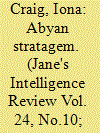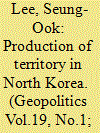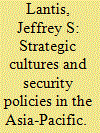| Srl | Item |
| 1 |
ID:
115492


|
|
|
| 2 |
ID:
129621


|
|
|
|
|
| Publication |
2014.
|
| Summary/Abstract |
One of the prevalent stereotypes about North Korea is that it is the world's most isolated country. This view derives from North Korea's ruling ideology - juche - which calls for territorial isolation from external influences. For this reason, any territorial strategy like the introduction of special economic zones is generally regarded as an inevitable economic choice forced upon it. However, I argue that it is not that North Korea has no choice but to open its territory due to economic suffering but that North Korea's own territorial imperative, 'security first, economy next,' determines how it produces territory. To do so it deploys various territorial strategies such as de-bordering, re-bordering, and zoning. In this sense, North Korea's production of territory manifests Jean Gottmann's idea of territory first as shelter for security and next as a springboard for opportunity.
|
|
|
|
|
|
|
|
|
|
|
|
|
|
|
|
| 3 |
ID:
132862


|
|
|
|
|
| Publication |
2014.
|
| Summary/Abstract |
Reflecting the culturalist turn in security studies, this special issue shows how one of the most powerful tools of security studies illuminates the origins and implications of the region's difficult issues, from the rise of China and the American pivot, to the shifting calculations of other regional actors. Strategic culture sometimes challenges and always enriches prevailing neorealist presumptions about the region. It provides a bridge between material and ideational explanations of state behaviour and helps to capture the tension between neoclassical realist and constructivist approaches. The case studies survey the role of strategic culture in the behaviours of Australia, China, Japan, the Philippines, South Korea, and the United States. They show the contrast between structural expectations and cultural predispositions as realist geopolitical security threats and opportunities interact with domestic elite and popular interpretation of historical narratives and distinctive political-military cultures to influence security policies. The concluding retrospective article devotes special attention to methodological issues at the heart of strategic cultural studies, as well as how culture may impact the potential for future conflict or cooperation in the region. The result is a body of work that helps deepen our understanding of strategic cultures in comparative perspective and enrich security studies. As disputes intensify over territory and resources, as regional militaries develop and leaders adjust their strategic calculus and defence commitments, the dovetailing of culture and politics in the Asia-Pacific shows through.
|
|
|
|
|
|
|
|
|
|
|
|
|
|
|
|